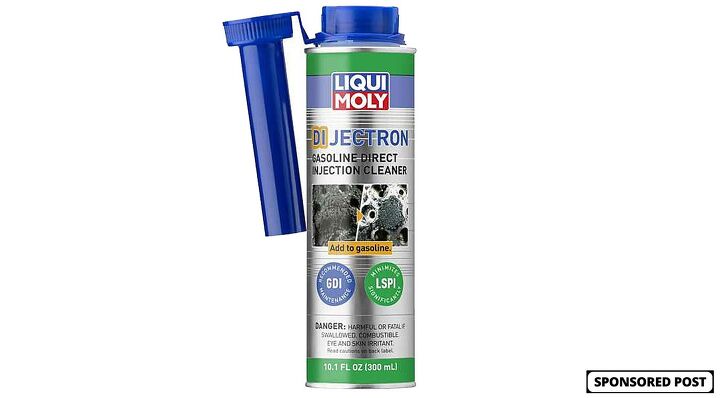Clean Your Direct-Injected Engine With Liqui Moly's DIJectron
Gasoline direct injection, or GDI, is one of the most crucial bits of technology in the modern internal combustion engine. In engines equipped with GDI, highly pressurized gasoline is sprayed directly into the combustion chamber rather than being injected at lower pressure upstream from the intake valve. That leads to superior fuel economy and greater power density, with cooler cylinder temperatures and more precise control over the fuel injection.
But as with any technology, there are some trade-offs to gasoline direct injection, and one of the most hazardous and potentially costly is low-speed preignition (LSPI). LSPI refers to a phenomenon in which, under certain low-speed, high-load circumstances, spontanously ignited droplets of fuel or oil can ignite the fuel air mixture in the cylinder prematurely during the compression stroke. That causes the pressure in the cylinder to spike while the piston is still completing its upward stroke, creating a huge resistive force the piston must overcome, which can lead to catastrophic engine failure.
Just how catastrophic? LSPI events have been known to damage pistons, piston rings, spark plugs, connecting rods, and even cylinder walls beyond repair. In other words, there’s a non-zero chance that low-speed preignition could turn your advanced, powerful, fuel-efficient GDI engine into a very large aluminum paperweight.
So, how do you protect yourself against the headaches and financial hardship that LSPI can bring?
At a minimum, you should always follow manufacturer recommendations with regard to the specification of the motor oil and the quality of the fuel you use. Additionally, you can minimize the risk of having an LSPI event by keep your fuel system in the best possible, cleanest condition.
Liqui Moly DIJectron was formulated specially to target one of the primary culprits behind low-speed preignition: debris and carbon deposits in and around the fuel injectors. DIJectron is a highly efficient and unique combination of proven PEA* technology and the latest additive generation. It achieves maximum cleaning performance in the combustion chamber, in and around the injector tip and in the entire fuel system. Furthermore, DIJectron stops the formation of new deposits so that complex injector systems always work at the highest efficiency. Regular use of DIJectron significantly reduces the risk of engine damage caused by Low Speed Pre Ignition (LSPI), optimizes engine performance, reduces exhaust gas emissions and protects the fuel system from corrosion even with Ethanol-contents in the fuel.
On top of being effective and well-formulated, DIJectron is easy to use; just follow the recommendations on the can and pour the contents into your gas tank, contents (300 ml) is sufficient for 40–70 Liters (10.5 gal. to 18 gal.) of fuel. DIJectron will immediately start to circulate through your fuel system and get to work clearing out deposits. Liqui Moly recommends doing this every 2400 miles (4000 km) or so for the best protection.
If you’re concerned about any potential adverse effects, not to worry: Liqui Moly DIJectron is cleared for use with particulate filters (GPF) and catalytic converters, There are other fringe benefits to using it, too – namely, cleaning out your fuel system and guaranteeing proper fuel atomization helps to optimize your vehicle’s fuel consumption and reduce emissions, while contributing to better drivability.
Low-speed preignition can be a serious cause for concern for gasoline direct injection, especially those equipped with turbochargers, where higher-than-normal intake charge pressures can increase the likelihood of fuel preignition. But with Liqui Moly’s advanced DIJectron fuel system cleaner the risk of having an LSPI event caused by deposits on your fuel injector and the catastrophic engine failure it can cause, is minimized and aren’t any reason to lose sleep.
To learn more, head to Liqui-Moly.com.
More by AutoGuide.com Staff
































Comments
Join the conversation